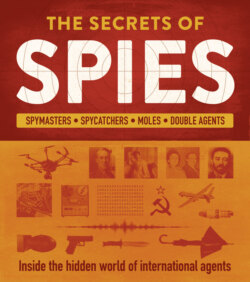Читать книгу The Secrets of Spies - Weldon Owen - Страница 64
На сайте Литреса книга снята с продажи.
ОглавлениеA NEW TYPE OF WAR
65
PARANOID DELUSIONS?
As intelligence work gained greater priority, various nations likewise increased
their anti-spying efforts. Spies were arrested, imprisoned, and even executed,
sometimes in retaliation for defeats that were blamed on espionage. However,
these anti-espionage efforts often spilled over into paranoia. For example,
shepherds northeast of Paris were arrested by the French authorities for moving
their flocks in patterns thought to be signals for German observers, while artists
were interrogated for daring to sketch the countryside. In England, renowned
Irish artist John Lavery was arrested for painting a naval port, having been
commissioned to do so by the Admiralty as an official war artist!
That said, to misquote Philip K. Dick, just because you’re paranoid doesn’t
mean they’re not after intel. In an innovative move, Dutch windmills were
stopped and started in a seemingly haphazard fashion that concealed Morse
code signals to German forces, while Belgian train engineers opened and
closed their engines‘ fireboxes at night to send light-based Morse code
messages to British agents in the Netherlands. The idea of spy-sheep
wasn’t quite as ridiculous as it might have sounded.
NEW TECHNIQUES, NEW TROUBLES
Radio and telephone messages were deemed vital by all sides in
the conflict for effective command. However, most soldiers and
politicians underestimated the extent to which their messages could
be intercepted and decoded, or disrupted. Telegram and telephone
lines could be severed, and the British broke German undersea cables
at the outbreak of the war, thus forcing messages to go through
networks that could be more easily eavesdropped, such as Britain‘s
own telegram system. Wireless connections afforded by the new radio
technology could also be tapped into. The German “Moritz” apparatus
was a signal amplifier connected to a set of copper terminals. British
soldiers crept into No Man‘s Land under cover of darkness, and
attached the Moritz to telephone or telegram lines leading to directly
to British command centers. Unencrypted radio transmissions could
easily be picked up by simply tuning into the right channel, if one had
a wireless, knew the frequency, and could understand the language
being spoken. Instructions to encode messages were often lost or
not followed due to a lack of understanding of its importance.
Below: Three British
and French soldiers
observe German
positions with
binoculars while a
fourth communicates
with artillery via a
field telephone.
Above: A German soldier talks on a telephone attached to a tree.
HUMAN ERROR
In the first month of the war, the outcome of the Battle of Tannenberg between Russia and Germany was
decided in part by a combination of technological shortfalls and human error. Russian command had
limited supplies of cable to lay down for telephone and telegram communications, and had to rely on radio,
but they were also short on copies of their new codebooks. Messages were sent in the clear, uncoded, with
nothing protecting them but the hope that they would not be picked up. The combined equipment
shortage and poor comms discipline meant that enough Russian messages were intercepted to determine
their troop movements and, ultimately, a German victory. This devastating defeat led to the almost
complete destruction of the Russian Second Army, causing the Russians to retreat from East Prussia.
